One of the most important preparations you can have as a prepper is the ability to replenish your water storage supply.
Regardless of how much water you have stockpiled, there’s always a chance that your supply will run out or that your supply will become contaminated in the event of a power grid down disaster scenario where water stops coming out of the faucets.
For situations like this, it’s wise to have the systems in place that can replenish your water supply so you can be truly self-sufficient, and harvesting your own rainwater is one of the easiest and simplest ways that you can do so.
But in some states, it’s not so simple. While rainwater harvesting is totally legal and unregulated in most states, there are a few states where rather tight restrictions are in place that you should be aware of.
The reason for this is because since water availability and qualities can vary greatly across the United States, certain states have regulations in place that are intended to find a balance between protecting water sources while also protecting the rights of property owners.
Here are the states where harvesting rainwater is restricted or otherwise regulated:
Arkansas
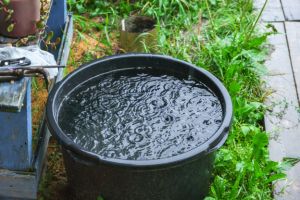 In the state of Arkansas, all rainwater harvesting systems must meet local plumbing codes and be designed by a certified engineer who is licensed within the state. The engineer must make sure that the harvesting system is designed with cross-connection safeguards and is in compliance with the Arkansas Plumbing Code.
In the state of Arkansas, all rainwater harvesting systems must meet local plumbing codes and be designed by a certified engineer who is licensed within the state. The engineer must make sure that the harvesting system is designed with cross-connection safeguards and is in compliance with the Arkansas Plumbing Code.
Related: The First Water Source That Will Disappear in a Crisis
Additionally, the water harvested can only be used for non-potable use, meaning that it cannot be used for drinking but can be used for other purposes, such as bathing or cooking.
Colorado
Colorado arguably has the strictest rainwater harvesting laws in the United States. Residents of Colorado are only allowed to collect rainwater with a maximum of two rain barrels that together have a capacity of 110 gallons.
Furthermore, this water can only be used for outdoor purposes (such as watering crops or gardens) on the property where it was collected. It may not be transported outside of the property.
Georgia
Similar to Colorado, Georgia mandates that any rainwater harvested can only be used for outdoor purposes.
Idaho
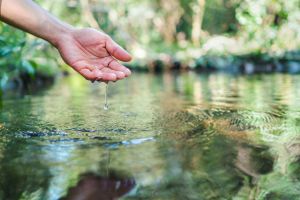 In Idaho it’s perfectly legal to harvest rainwater, with the only caveats that the rain cannot first have entered a natural waterway (such as a stream or river) and as long as the process of collecting the rainwater does not interfere with the water rights of other individuals and property owners.
In Idaho it’s perfectly legal to harvest rainwater, with the only caveats that the rain cannot first have entered a natural waterway (such as a stream or river) and as long as the process of collecting the rainwater does not interfere with the water rights of other individuals and property owners.
Illinois
Illinois is another state that has strict rainwater harvesting laws. In Illinois, any rainwater harvested can only be used for non-potable purposes, so it can’t be used for drinking but can be used for tasks such as watering gardens, cooking, or personal hygiene use.
All rainwater harvesting systems must also be constructed in strict accordance with the Illinois Plumbing Code.
Kansas
Kansas requires you to obtain a permit to harvest rainwater that isn’t used for household purposes. For example, if you plan on using your rainwater for drinking, watering your pasture or livestock, or for watering your gardens or crops you won’t need to obtain a permit.
If you plan on using the rainwater outside of your household, such as offering it to another family for instance, you will need to obtain a permit to proceed.
Louisiana
Rainwater harvesting is fully legal in Louisiana, but certain jurisdictions require that covers be permanently set up over water collection tanks or cistern.
Nevada
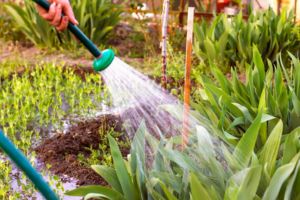 It used to be illegal to harvest rainwater in Nevada, but it no longer is so long as the water is only used by the household that collected the rainwater and as long as that water is only used for non-potable uses such as gardening or personal hygiene.
It used to be illegal to harvest rainwater in Nevada, but it no longer is so long as the water is only used by the household that collected the rainwater and as long as that water is only used for non-potable uses such as gardening or personal hygiene.
Related: How to Build Self-Watering Raised Garden Beds
Ohio
Rainwater harvesting is fully legal in Ohio for both potable and non-potable uses, but the only regulation is that each rainwater harvesting system can only provide potable water to a maximum of 25 people.
Seeing as much as most households have far fewer than 25 people in them, this shouldn’t be an issue for most families.
Oregon
Rainwater harvesting is legal in Oregon so long as the rainwater is only collected via a rooftop system. It’s a major misconception that it is not legal to harvest rainwater in Oregon.
Texas
Rainwater harvesting is legal in Texas so long as each rainwater collection system is incorporated into the design of the home or building that is collecting it. Furthermore, each household needs to submit a written notice to their local municipality stating their intent to harvest rainwater.
Utah
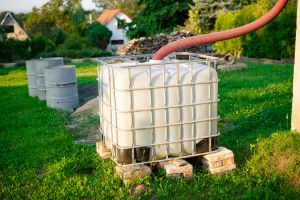 Rainwater harvesting is legal so long as it is done by a person who is registered with the state’s Division of Water Resources
Rainwater harvesting is legal so long as it is done by a person who is registered with the state’s Division of Water Resources
So long as the person owns or leases the land where they are collecting the rainwater. This person can only store a maximum of 2,500 gallons of rainwater at one time.
A person who is not registered with the Division of Water Resources can only store a maximum of 200 gallons of water between two containers, with each container having to be a maximum of 100 gallons.
In other words, you can’t store 200 gallons if it’s divided into a 120 gallon and an 80 gallon container.
Washington
Like Oregon, it’s another major misconception that rainwater harvesting is illegal in Washington state.
Rainwater harvesting is legal so long as it is collected on a structure that has a purpose besides collecting rainwater (so setting up a rainwater harvesting system on an ordinary home is legal) and so long as the rainwater is only used on the property where it was collected, meaning that it cannot be transported outside of the property.
Rainwater harvesting may not be totally illegal in these states, but as you can see, there are some states where there are a few rules you’ll need to keep in mind.
Moreover, if you want to ensure that the water you’re collecting for you and your family is safe to drink, proper filtration is key.
Learn here how to build an efficient and affordable rainwater harvesting and purification system that can store up to 165 gallons of water. This setup not only meets regulatory standards but also ensures you have clean, potable water for you and your family.
You may also like:
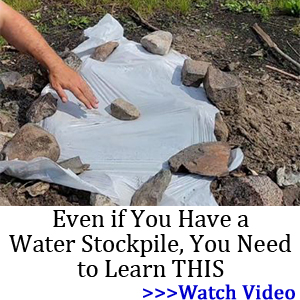 Worst States to Live In If You Have to Defend Your Property
Worst States to Live In If You Have to Defend Your Property
Backyard Projects That Might Get You Arrested (Video)
11 Overrated Prepping Items You Don’t Really Need
How to Tap a Phone Line for Power When SHTF
The Desperate Measures the Government Is Secretly Resorting To

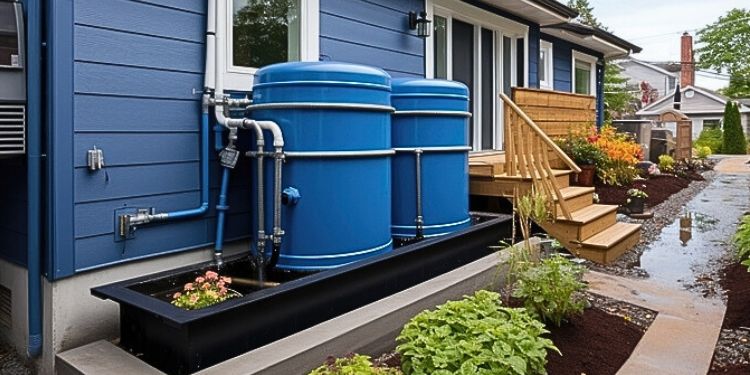







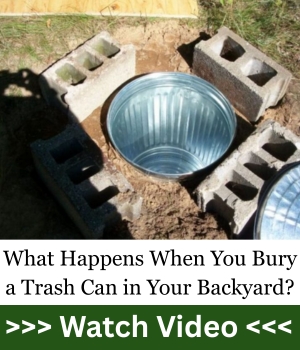






The Lord giveth and politicians taketh it away.
You think it is bad today, wait when Harris and Walz get elected by the many Demoncrats and illegal voters provided by the dynamic duo of Marxism.
Look at the “Delta Smelt” California controversy of diverting agricultural irrigation water pouring into the Pacific ocean than on farm crops.
Off topic: Since the liberals want to give free stuff to illegals, why not quit paying the Chinese state a million dollar’s rent fee for their Panda’s in American zoo’s?
Give the Panda’s American citizenship from an oppressive regime instead.
The California Delta Smelt Controversy and Its Impact on Water Policy
Do you want a socialism or business run presidential administration for the next four years?
China owns most our homeland. Ask Teddy Daniels
All or most of the states mentioned are RED states. It’s your own party…fools.
Lisa T, trump bankrupted all of his business.
And no Sam, liberals are not giving free stuff to illegals. Stop watching bullshit right wing propaganda.
Texas regulations on rain water harvesting apply to public utilities selling potable water for commercial and residential customers. So far as an individual harvesting rainwater Texas has laws prohibiting HOAs from banning rainwater harvesting, also exempts a private rainwater system from property tax and offers good tax breaks for private systems. The only real restriction on harvesting is that, sometimes, it don’t rain for 2-3 years.
Screw HOA’s and the people who live in them, lemmings, everyone a sheeple.
They kicked me out of my neighborhood due to my political affiliation. lol
The More We Know
You must not live anywhere near Houston!
Looks like it might all have to do with having systems that do not allow for mosquitoes to breed. I’ve seen some pretty dicey stuff in BubbaTropolis.
Lake Mead is the only source of water in Vegas and it is slowly being drained as I noticed firsthand in Boulder City.
Our family moved away after realizing there really isn’t a route out of the valley for miles and miles and miles.
Purchase a 12 volt submersible pump, 1 or 2 12 volt batteries, 12 volt self regulating solar panel, and a garden hose with a nozzle. Lower pump into drilled well and connect battery to pump and solar panel to battery. Make sure you get a on/off switch. If you have a pitched roof well cover the solar panel will be fine there and all else will be hidden. Total cost under $250 and will yield 5 gallons per minute depending on depth.
Do you have instruction link?
Bev, I’m sorry, I don’t.
Your editing is horrible: “Moreover, if you want to ensure that the water you’re collecting for your and you family is safe to drink, proper filtration is key.” It should be “you and your”. Get with the times and edit your stuff properly.
come on man….who cares about that shit?
Get a life crabby patty!! Just take in the information and use it. Why trash someone for trying to help people.
hee’s not yo’re englis gramer student, professer. 🤪
who cares what the states say…I mean really….just do what you want and dont advertise it.
Until you get fined, why not quit voting those corrupt bureaucrats into public office in the first place that cause the problems?
That’s what I do but the city I live in promotes saving rainwater and I’m in an HOA unfortunately! I have eight rain barrels and it’s all filled up by gutter system l installed works Great
These states where the state govt takes ownership of
God’s free gift to all, is a sin, and God will hold those states accountable for making a money making business out of what God gives to all freely !
GOD owns the water and rain. Not the governments !
New York has laws about harvesting rain water. It’s legal, but the water piping has to be marked with purple and labeled as non potable.
Kansas
Kansas requires you to obtain a permit to harvest rainwater that isn’t used for household purposes. For example, if you plan on using your rainwater for drinking, watering your pasture or livestock, or for watering your gardens or crops you won’t need to obtain a permit.
That is incorrect.
Buddy lives there. You are allowed to collect up to 4 acres worth of rainwater FOR ANY PURPOSE, and without permits. More than that you needed to contact their agricultural department for advisement.
MANY people have cisterns in his State.
You must not live anywhere near Houston!
I think you forgot California!
As a prepper, one has to have the mindset of “Don’t ask, Don’t tell.”
Do not drink the rain water until it’s been filtered! Stratospheric aerosol injections. Chemically nucleated rain, ice and snow are poison. Remember “they own the weather.” Install a hand pump on your well. Have a cistern added even. There are plenty of ways to disguise your collection of water.
Glad I live in Florida where our Rainwater Collection Laws are……..Go for it! Oh, and here are some rebates and tax incentives to help you out.
In Florida, you’re more than welcome to collect rainwater and reuse it as you see fit.
The Free-State of Florida…..your welcome.
Just a thought, I do hope everyone who gets their water from the earth or sky or pipes should ALWAYS purify it before it is to be used, for anything. Being a retired Military flier, everyone should be aware that so many aircraft on occasion dump fuel into the air for many different reasons. This happens all over the world, and the air streams many carry that contaminated air for thousands of miles. Does anyone remember the acid rain aria, I doubt it just went away. So, the ground we walk on becomes contaminated, the trees and grasses and food we grow, become contaminated. Better to be safe than become a mutant or die. Just saying.
Great point! purifying water from any source is absolutely essential, especially today. Whether it’s rainwater, well water, or tap water, contaminants are everywhere. Fuel dumping from aircraft, while not constant, does happen during emergency procedures, and those chemicals don’t just disappear, they can end up in the soil and water, carried by wind currents and rainfall.
You’re also right to bring up acid rain, it didn’t just “go away.” While it’s less of a hot topic now thanks to environmental regulations, industrial emissions still affect rainfall in many parts of the world. And with modern concerns like microplastics and PFAS (“forever chemicals”) now being found in rainwater globally, it’s even more reason not to trust untreated water, no matter the source.
Bottom line: harvesting rainwater is smart, but only if you treat it. A good filtration system and disinfection process should be a non-negotiable part of any off-grid or survival setup. Like you said: better safe than sorry.